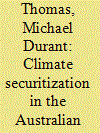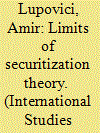|
|
|
Sort Order |
|
|
|
Items / Page
|
|
|
|
|
|
|
| Srl | Item |
| 1 |
ID:
142026


|
|
|
|
|
| Summary/Abstract |
This paper analyses the response by the Australian political–military establishment to climate change through the lens of securitization theory. The research used mixed content analysis techniques to systematically examine more than 1500 speech-acts, policies and doctrinal articles between 2003 and 2013. It argues that the Australian Defence Force (ADF) was not a climate securitizing actor and that its response to climate change was mediated by the political partisanship surrounding broader national policy debates on climate change. The politicization of climate change made it increasingly difficult for the ADF to publicly adopt meaningful climate policies. It subsequently crafted a strategy that minimized any investment (resource or reputational) lest a change of government rendered them invalid or it drew unwanted criticism. At the very heart of this finding exists the challenge of an avowedly apolitical institution responding to what emerged in the Australian context as a politically partisan security issue. The more serious indictment concerned how national security policy (in the context of climate change as a security issue) became hostage to the politics of climate change.
|
|
|
|
|
|
|
|
|
|
|
|
|
|
|
|
| 2 |
ID:
136101


|
|
|
|
|
| Summary/Abstract |
This article argues that popular culture can make an important contribution to security studies, and especially critical security studies, either by offering alternative narratives that challenge the dominant view of security or by deconstructing the process of securitization. It then examines a genre of popular culture that until now has been largely ignored by security studies, noir police procedural novels, and shows how the contemporary police detective can no longer be viewed in the same way as the defender of the status quo depicted in the traditional police procedural. At the same time, he or she does not correspond to the portrait of the security professional, a member of those forces that contribute to the way security is officially defined. He or she has become, instead, a critic of prevailing security practices. To illustrate how this has happened, the article takes novels from two well-known authors of noir procedurals – Faceless Killers by Sweden’s Henning Mankell and Rounding the Mark by Italy’s Andrea Camilleri – and explores how their two very different police detectives, Kurt Wallander and Salvo Montalbano, treat the fears, anxieties and insecurities aroused by immigration in their respective societies and, in doing so, assume in their own way the role of critical security analyst.
|
|
|
|
|
|
|
|
|
|
|
|
|
|
|
|
| 3 |
ID:
137015


|
|
|
|
|
| Summary/Abstract |
The concept of resilience was born and grew up in the environmental sciences during the 1970s. After migrating into many other disciplines, resilience is now ‘coming home’ to the politics of the environment in the name of security. The field of climate change induced migration is investigated as a paradigmatic case of environmental security. On a theoretical level, resilience is studied as a governmentality; that is, as advanced liberal government which governs through contingency. On an empirical level, a brief genealogy of environmental migration is presented with a focus on the latest discursive shift towards resilience. It is demonstrated that climate change induced migration was once represented as a pathology to be prevented and, more recently, as an issue of refugee rights. However, the shift towards resilience has reframed the debate. Climate change-induced migration is now presented as a rational strategy of adaptation to unavoidable levels of climate change and the relocation of millions of people is rendered acceptable and rational. The most drastic policy implication of this shift is that the space of the political is eliminated. Climate change is presented as a matter of fact rather than as a social problem that could still be tackled by significant emission reductions and lifestyle changes by residents in the major developed economies.
|
|
|
|
|
|
|
|
|
|
|
|
|
|
|
|
| 4 |
ID:
136105


|
|
|
|
|
| Summary/Abstract |
In January 2012, the US administration released new strategic guidance for the Department of Defense entitled ‘Sustaining US Global Leadership: Priorities for 21st Century Defense’. Two different security approaches seem to coincide in this document. By providing a governmental reading of the new strategic guidance, the aim of this article is to discuss if and how the guidance links a sovereign security understanding of great power politics on one side to governmental rationalities on the other. First, the guidance is discussed with regard to its main aims and strategies; then, second, the impact of governmentality in the guidance is revealed and systematized. Finally, the function that governmental logics have in the document, and the conceptual and political role that the minimally mediated encounter of sovereign (military) power politics with governmental rationalities plays, are considered.
|
|
|
|
|
|
|
|
|
|
|
|
|
|
|
|
| 5 |
ID:
134493


|
|
|
|
|
| Summary/Abstract |
Most discussions concerning how to evaluate theories make reference to empirical, methodological, logical, or normative criticisms. Less attention is given to how challenges in the theory itself affect the choice of cases. In this paper, I put forward the concept of observational criticism, which aims to trace biases in the empirical employment of a theory. While it overlaps with some of the criticisms mentioned above, observational criticism distinctly focuses on what we can learn about a theory through the prominence or absence of cases, or types of case, in the scholarship. To this end, I suggest a three-stage approach for this criticism and I demonstrate each of these stages, as well as the utility of this framework, through a consideration of securitization scholarship—and more specifically of how securitization studies have overlooked the case of securitization moves in Israel. I suggest that although the concept of securitization has generated a great many studies on various theoretical and empirical issues, and despite the prominence of security discourse and practices in Israel, securitization scholarship has tended to avoid studying the securitization processes of this country. Following this mode of criticism, I argue that securitization theory could be more easily implemented in the case of Israel by, among other things, further clarifying the meaning of securitization success and its duration.
|
|
|
|
|
|
|
|
|
|
|
|
|
|
|
|
|
|
|
|
|